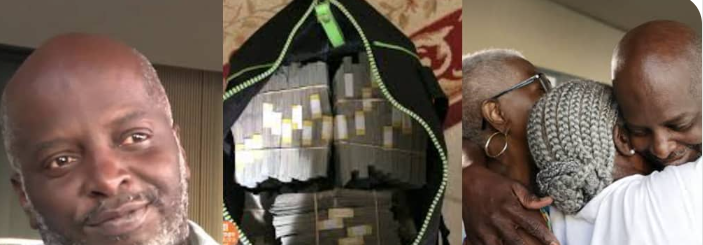
400 Years for Nothing: Florida Man Freed After 34 Years in Prison, Awarded $1.7M After Shocking Revelation
In a twist that sounds more like the plot of a wrongful conviction drama than real life, Sidney Holmes, a Florida man sentenced to an unthinkable 400 years in prison, has finally been declared innocent after serving 34 years for a crime he didn’t commit. At 58 years old, Holmes
In a twist that sounds more like the plot of a wrongful conviction drama than real life, Sidney Holmes, a Florida man sentenced to an unthinkable 400 years in prison, has finally been declared innocent after serving 34 years for a crime he didn’t commit. At 58 years old, Holmes walks free with a compensation of $1.7 million, but no sum of money can restore the decades stolen from his life.
Convicted in 1989 at just 23 years old, Holmes was accused of acting as the getaway driver in a robbery near Fort Lauderdale. Despite glaring holes in the evidence against him, law enforcement pushed forward with charges that would result in a sentence meant to effectively bury him alive behind bars. The severity of the sentence—400 years—raised eyebrows even then, but now stands as a chilling monument to the cracks and crevices of America’s criminal justice system.
His alleged crime? Driving a car matching the description of one involved in an armed robbery. There were no fingerprints. No DNA. No weapon found. And crucially, no concrete evidence linking him to the actual act. Still, Holmes was convicted, and the courtroom that day in 1989 unknowingly signed off on the destruction of a young man’s life.
Fast forward three and a half decades, and a glimmer of justice finally broke through. A reinvestigation by the Conviction Review Unit of the Broward County State Attorney’s Office began in 2020 after Holmes himself filed a claim of innocence. The review found what his defense had long argued—that Holmes was nowhere near the crime scene and had been wrongfully identified and targeted from the start.
By March 2023, Holmes was officially exonerated and released, having endured more than three decades in prison for a crime he never committed. He exited the correctional facility not with rage, but with resolve. “I refuse to let them take my purpose,” he told reporters, his voice steady with both pain and strength.
The state of Florida has since approved his compensation claim under the Victims of Wrongful Incarceration Compensation Act. The $1.7 million payout averages to about $50,000 per year spent behind bars. Yet, for many, including Holmes himself, no amount of money can truly compensate for the birthdays missed, the family lost, or the normalcy that vanished during those years.
Social media erupted with disbelief and sympathy. Civil rights attorney Ben Crump tweeted Holmes’ story, calling attention to how easily lives can be shattered by flawed legal processes. “Sentenced to 400 years for a crime he didn’t commit, Sidney Holmes lost 34 years of his life behind bars. Now, he’ll receive $1.7M in compensation — but no amount can repay stolen time,” Crump said.
While Holmes is now a free man, the scars of his imprisonment are deep. He missed the technological revolution, the rise and fall of presidents, the transformation of entire cities, and the death of loved ones. Prison became the backdrop of his life story, not by choice, but by a failure of justice.
But rather than retreat into obscurity or let bitterness consume him, Holmes has emerged with a new mission: to fight for others who remain unjustly imprisoned. He has already begun speaking at forums, advocating for legal reforms, and collaborating with organizations dedicated to justice reform. “There are thousands more,” he said in a recent interview, “and they don’t have 34 years to waste.”
His case has sparked renewed conversation about the disproportionate sentencing in the U.S., especially in cases involving Black defendants. Data shows that people of color are far more likely to be wrongfully convicted than their white counterparts. Holmes’ 400-year sentence, without parole, exemplifies a system that often punishes too severely and reviews too slowly.
Legal experts say the case should prompt reflection on the use of eyewitness testimony, which was a key element in Holmes\' original conviction but has since been widely discredited for its unreliability. Additionally, the case has reignited calls for independent conviction review units nationwide and for mandatory periodic reviews of long-term sentences.
The Florida legislature is also under pressure to increase the compensation cap for wrongful convictions. Critics argue that $50,000 per year is not just insufficient—it’s insulting given the depth of loss incurred by people like Holmes.
Still, amidst the legal chaos and emotional trauma, Holmes remains remarkably composed. Friends and family who stood by him describe him as a man of faith, someone who found peace even in the darkest corners of a prison cell. \"I had no control over what they did to me,\" Holmes told reporters. \"But I had control over how I lived through it.\"
His story has become a beacon for advocates fighting to free other wrongfully imprisoned individuals and a testament to the resilience of the human spirit. It’s also a sobering reminder that justice delayed is justice denied—and that freedom, once taken, can never be fully returned.
As he rebuilds his life in a world that moved on without him, Holmes is focusing on healing, reconnecting with family, and pursuing advocacy work. He says he hopes to write a memoir and perhaps launch a nonprofit to help others navigate the nightmare he once endured.
Meanwhile, the same justice system that failed him so catastrophically remains under scrutiny. Holmes’ release may be a cause for relief, but it is not a triumph. It is an indictment of a legal structure that still allows such miscarriages of justice to occur—and a call to action to ensure Sidney Holmes is the last of his kind.
Share this post
Related Posts

Davido Arrives in Brooklyn Ahead of “5IVE ALIVE TOUR” as Premium Suite Tickets Hit $12,868
Afrobeats megastar Davido has officially landed in Brooklyn, New York, ahead of his much-anticipated “5IVE...

“I Didn’t Move Abroad Because My Wife Will Earn More Than Me” — Noble Igwe’s Honest Confession Sparks Heated Debate on Gender Roles and Ego
Media personality and fashion entrepreneur Noble Igwe has set social media abuzz after making a...

“Free Colombia Forever”: Petro’s Fiery Warning After Trump Signals Possible U.S. Strike
Tensions between Washington and Bogotá have escalated sharply after Colombian President Gustavo Petro issued one...